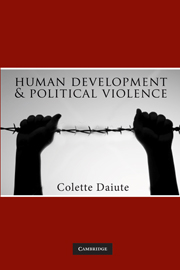Book contents
- Frontmatter
- Contents
- List of Figures
- List of Tables
- Preface
- 1 Beyond the Youth Gap in Understanding Political Violence
- 2 Youth and Society Work Together
- 3 Living History
- 4 Critical Narrating
- 5 Participation Matters
- 6 Sociobiographies
- 7 Human Development in Conflict
- Appendix: Examples of Public Stories across Positions in the DSTY Research Workshop
- References
- Index
6 - Sociobiographies
Published online by Cambridge University Press: 05 June 2012
- Frontmatter
- Contents
- List of Figures
- List of Tables
- Preface
- 1 Beyond the Youth Gap in Understanding Political Violence
- 2 Youth and Society Work Together
- 3 Living History
- 4 Critical Narrating
- 5 Participation Matters
- 6 Sociobiographies
- 7 Human Development in Conflict
- Appendix: Examples of Public Stories across Positions in the DSTY Research Workshop
- References
- Index
Summary
MANY WAYS TO TELL A WAR STORY
War influences generations, in large part, through how people talk about it. Having considered the cultural–historical process of script making across a political system, we now explore how individual young people transform national scripts into personal stories. Stories are variations on shared scripts, still social but specific in experience and choice, as expressed in the youth drawing in Figure 6.1. Although not asked to talk or write about war, some participants chose to do so, albeit in very different ways that provide a segue for discussing how young people define themselves in the inescapable shadow of political violence.
There is a debate about building a monument for children killed during the war, and it is very sad to see disagreement whether or not it should be for all children from all of Sarajevo or only for its Federation part. They still debate this issue, tensions are really big, and parents of those children feel used.
Consistent with the “tensions abound” script, 22-year-old Diana narrates a conflict in her hometown of Sarajevo in BiH. In this brief story, Diana foregrounds the war and its consequences as influencing “all Sarajevo.” As narrator, Diana embodies the tension, “it is very sad to see …” and implies her view that the monument should be “for all children from all Sarajevo.” Although not explicitly about herself, Diana's story presents a self-image. She expresses the local emotional context with comments about sadness, tensions, and feelings of being used.
- Type
- Chapter
- Information
- Human Development and Political Violence , pp. 185 - 223Publisher: Cambridge University PressPrint publication year: 2010



